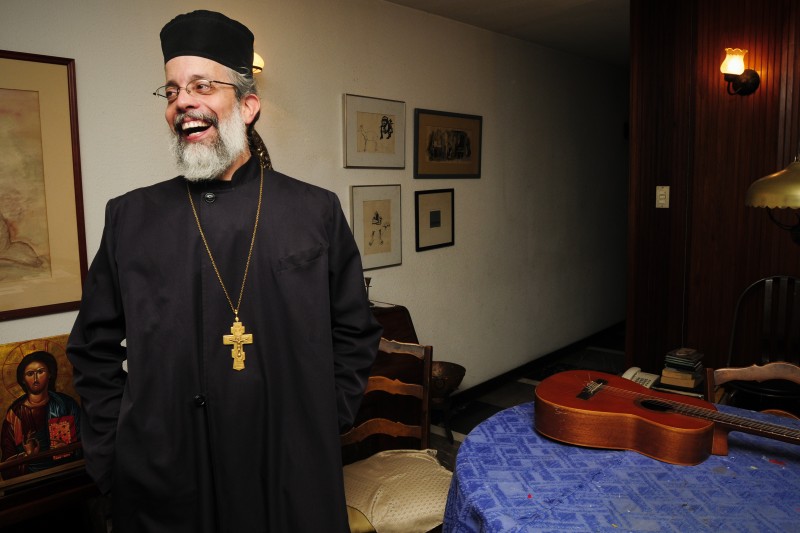
Orthodox priest, Fernando Rivas, has his own band, Irinika, which he uses to send the public a message of trust and faith, but without the religious label. “I'm out to convince people, not just stay with those already convinced,” assured the 47-year-old from Caracas. Photo: Jorge Santos Jr (used with permission).
Text originally published on the blog Tesis y Antítesis
A man attending a Fathers’ Day celebration, or the end-of-year function at his son's school, at first appears to be the most normal thing in the world. However, the fact that this parent is a priest, and also introduces himself to staff in his robes, at the very least would raise a few eyebrows and get people talking. For years this odd situation was life for Fernando Rivas, a graduate of an International Studies program, born in Caracas, the capital of Venezuela, in 1968.
Could it be that he was committing, in public, the most serious act of blasphemy? Not at all, as although Rivas is priest, he belongs to the Greek Orthodox Church, which permits its ministers to marry and have families. But this explanation has to be repeated constantly, as much by his children to their classmates and friends as by the priest himself when around other fathers at street fairs.
It all began in 1996 when Rivas and his wife decided to travel to Bulgaria, planning to study. Being an opera singer, the man of the house wanted to deepen his musical knowledge, while his wife went looking to improve her knowledge of visual arts, specifically of Byzantine iconography.
“Nosotros nos vamos a estudiar. Pero empezamos a ir a la iglesia y allí el sacerdote, que era ortodoxo, me comienza a pedir ayuda en la liturgia y luego de tanto tiempo me pregunta si no estoy interesado en ordenarme. Y así comenzó todo esto”.
We went there to study, but we began going to church and there the priest, who was Orthodox, began asking me for help with the liturgy, and after a long time he asked me if I was interested in getting ordained. That's how it all started.
In his apartment in La Florida, a middle class area of Caracas, this was how he recalled how he found his true calling, for which he needed another “yes” from his wife. “The women must agree and even have to sign a printed document,” he explained.
In 2006, Fernando Rivas finally got ordained a priest of the Greek Orthodox Church, and for all purposes in his religious life he is Father Elías. “In the same way as the Pope and other men of God in the history of humanity, we change our names, but in daily life I am still Fernando Rivas.”
Elías immediately sought to combine his passion, which was still strong when he took the robes, with his new commitment to God. He didn't abandon his music—instead he turned it into a spiritual tool, like the teachings in the Bible themselves. “Three years ago, I founded my band, Irinika, which in Greek means litany of peace. We play rock, but we also play ska and reggae, and I'm accompanied by professional musicians.”
When hearing a priest talk about “rock,” the first thing that comes to mind is the traditional opposition religious people have to this type of music, which seems like a contradiction. “Rock isn't just death and drugs,” Elías explains. “That's not true. It has been stigmatized, and we want to remove the stigma. Rock is also a testimony to life, which we use to send a message of faith and hope.” He says he grew up listening to the sounds of The Doors, Janis Joplin, and The Rolling Stones, and is especially fascinated with Pink Floyd.
Although a decade ago the staff at his son's school were surprised by his presence at various events, sporting the characteristic Orthodox attire, these days it is no less surprising for the public that see him at a “gig,” up on a stage in his robes.
“Para nosotros es obligatorio llevarla. Solo me la quito cuando estoy en mi hogar con mi familia o las veces que he tenido que interpretar a algún personaje en una ópera que requiere un vestuario característico. Pero siempre estoy con mi sotana, incluso en las presentaciones de Irinika”.
For us it is compulsory to wear them. I only take them off when I am at home with my family, or the times when I've had to perform a role in an opera that requires a specific costume. I am always wearing my robes, even at Irinika performances.
If there is one thing Father Elías does not like, it is when people say he plays “Christian rock.” He prefers to call his music “alternative rock,” as his target audience is not the devoted believers but all kinds of people looking for answers through God to the difficult situation through which humanity passes, but without any sort of religious label. “I'm want to convince, not just stay with the already-convinced,” he declared.
Elías is a university professor and singing teacher, a weekly contributor to a radio program with a segment called “Rock and Faith,” a family man with a wife and two children, and—if that wasn't enough—a priest. When asked how he finds time for this last role, he responds laconically, “My parishioners know that they can count on me 24-hours-a-day. Whatever must be interrupted for them, will be interrupted.”







1 comment